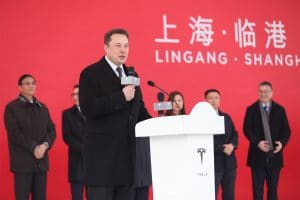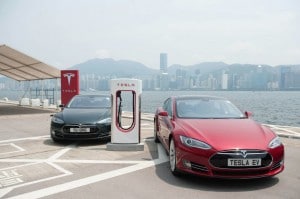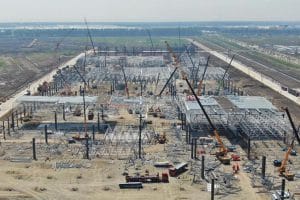Tesla is set to start running its first overseas assembly plant, Chinese authorities giving the carmaker approval to fire up an all-new factory in Shanghai.
The plant could prove critical for Tesla as it pushes to benefit from regulations that have turned China into the world’s largest market for plug-based vehicles. Demand had been limited, until now, by a variety of factors, including tariffs and the ongoing trade war with the U.S.
With the state energy company turning on full power to the factory on Thursday, speculation is that Tesla could begin production this month. Unusually, the company’s normally very public CEO Elon Musk failed to comment on the latest developments, advising those on his widely followed Twitter feed that he was going off-line “for a few days.”
(Madison, WI cab company goes all-electric, driving nothing but Tesla Model 3s.)
The approval by Chinese authorities comes just 10 months after Tesla broke ground on what it refers to as Gigafactory 3, a surprisingly quick turnaround in the auto industry.
The automaker has said that it hopes to be producing 1,000 Model 3 sedans in Shanghai by the end of 2019. That would fall well short of the plant’s eventual capacity – but it also would mark a far quicker ramp-up than what happened at Tesla’s only U.S. plant. The Fremont, California facility went through what Musk dubbed “production hell” after the launch of the Model 3 in July 2017. It took more than a year to come even close to original output targets and hammered the automaker’s bottom line.
Chinese authorities have gone out of their way to assist Tesla’s project, among other things, taking steps to speed up construction. But perhaps the most notable move came with the decision allowing the company to become the first foreign car manufacturer to wholly own its Chinese operations. Until now, other international manufacturers, such as General Motors, Volkswagen and Toyota, have had to enter into joint ventures with domestic Chinese auto companies.
In past tweets, CEO Musk had said the Shanghai plant will produce “affordable” battery-cars for domestic Chinese production. While production will begin with the Model 3 sedan, Tesla plans to build the Model Y electric-SUV there, as well, once it debuts next year.
(CEO Musk Says Teslas Going to be Pricier in the Future)
Playing in the Chinese car market is critical for automakers in general, considering it is today the world’s largest automotive market. The electric vehicle segment is also the world’s largest, spurred by the New Energy Vehicle, or NEV, guidelines enacted in late 2017.
Last year saw record sales of 1.1 million electric vehicles in China, up 300% from 2016 — and equal to 55% of global demand. Sales in the U.S., by comparison came to a much more modest 358,000 in 2018. But demand has slowed since July when the Beijing government pulled back national sales incentives.
Some skeptics worry that Tesla’s operations could kick off at a bad time. “You have all these unsold electric cars sitting on dealer lots,” said John McElroy, an industry analyst and host of the Autoline TV show. “We could be heading for an EV disaster.”
Several Chinese EV companies have been running into trouble, in fact, notably one that had been considered among the most promising, the start-up called NIO often referred to as “the Chinese Tesla-killer.” Its sales through August were down 72% from year-earlier levels and on September 24 it reported second-quarter earnings had nosedived. The company posted a loss of 3.11 yuan per share, or $0.45, compared with a consensus forecast of a 1.87 yuan loss.
But other observers believe that the slowdown is just temporary. Despite the loss of sales incentives, it’s new products, such as the upcoming Tesla Model Y, that should re-energize the Chinese market, said Michael Dunne, a long-time Chinese auto analyst and head of consulting firm Zozo Go.
“Once the new products are ready I think EV demand will start to rise again,” he said.



